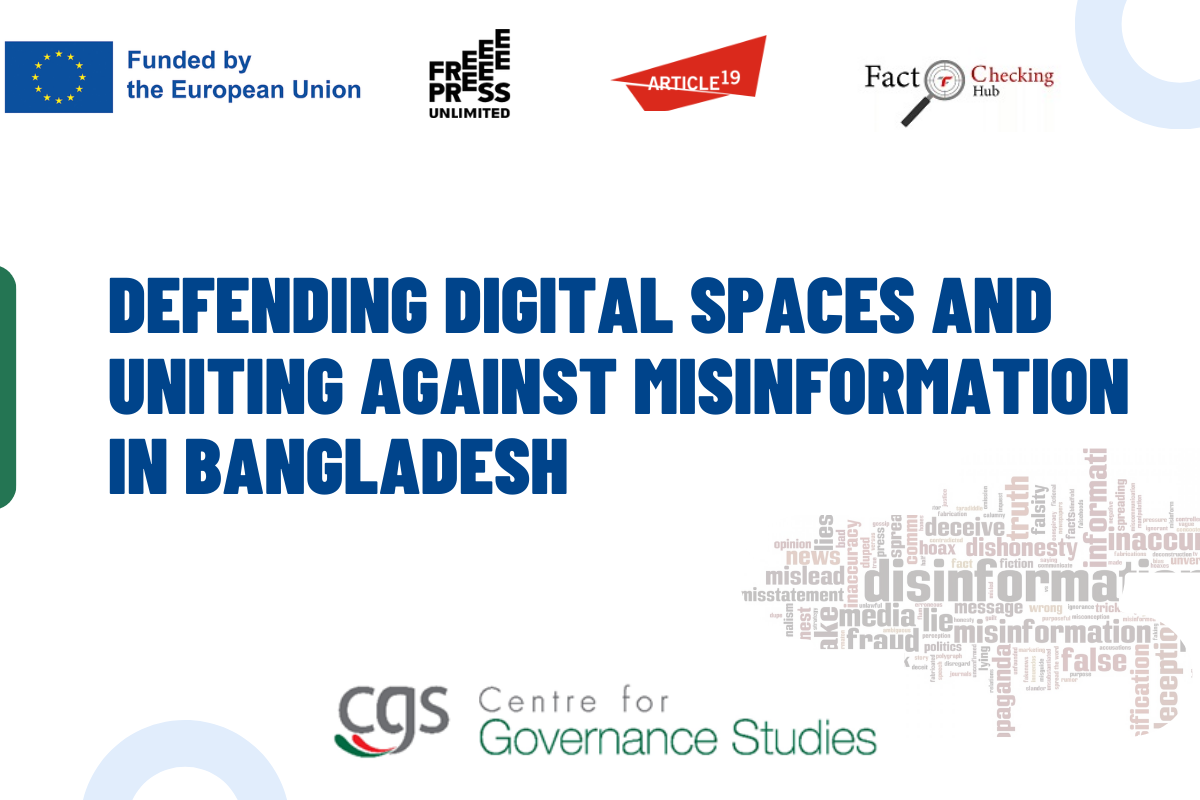Defending Digital Spaces and Uniting Against Misinformation in Bangladesh
06 November 2024
• Project Name: Defending Digital Spaces and Uniting Against Misinformation in Bangladesh
• Project Partner: European Union, Free Press Unlimited and ARTICLE19 Bangladesh and South Asia
• Project Duration: 12 months (November 2024 – October 2024)
About the Project
The Centre for Governance Studies (CGS), in collaboration with Daily Manabzamin, is implementing the 12-month project “Defending Digital Spaces and Uniting Against Misinformation in Bangladesh”. This project is under the Collaboration Lab project, administered by Free Press Unlimited and ARTICLE19Bangladesh and South Asia, with funding from the European Union. It combines the research and capacity-building expertise of CGS to tackle the critical issue of misinformation in the digital era, particularly in Bangladesh.
Misinformation, disinformation, and malinformation are major challenges in Bangladesh, weakening democracy, social unity, and the trust in institutions. In today’s digital world, the fast spread of false and misleading information damages public trust and makes it hard for people to make good decisions, showing how important it is to have reliable and fact-checked information. This project aims to address these issues by equipping individuals and communities with the necessary tools and knowledge to identify and combat these harmful narratives effectively.
The project takes a comprehensive approach to tackle this issue. Key activities include setting up a Misinformation Safety Cell and launching a Misinformation Tracker website to monitor and analyze disinformation trends. Research will identify key areas for intervention, while targeted training workshops will equip 160 journalists with the necessary skills to build resilience against misinformation. Furthermore, the initiative will raise awareness through reports in the media, dialogue sessions, talk shows, and social media campaigns, promoting critical thinking and establishing a strong system to counter the spread of misinformation, disinformation, and malinformation in Bangladesh.
Project Design and Method
This project is designed to address the critical issue of misinformation in Bangladesh through a combination of research, capacity building, media outreach, and collaboration among key stakeholders. The methodology integrates both qualitative and quantitative data collection, training, and awareness-building activities to create a comprehensive strategy for tackling misinformation.
Research and Data Collection: The project will conduct a study involving four Focus Group Discussions (FGDs) across eight divisions of Bangladesh, complemented by 12 Key Informant Interviews (KIIs) at the national level. Secondary data will be gathered from media news outlets and academic papers to provide a robust understanding of the misinformation landscape. The findings will be summarized and analyzed in a comprehensive report, which will be published to highlight the challenges and potential solutions to misinformation in Bangladesh.
Capacity Building and Training: Eight fact-checking and misinformation prevention workshops will be conducted, one in each division, targeting 160 journalists, social media influencers, and civil society members. These workshops aim to train 20 individuals in each division with the skills needed to identify and prevent misinformation, creating local knowledge hubs that can work collectively to combat the issue at a grassroots level.
Misinformation Monitoring and Tracking: A dedicated fact-checking cell will be established, and a misinformation tracking website has been launched to monitor news and social media platforms for misinformation on an ongoing basis. This website will provide regular updates, aiding civil society organizations (CSOs), media, government bodies, and the general public in identifying and addressing misinformation. The platform will act as a watchdog, helping to maintain the integrity of information in public discourse.\
Public Awareness and Media Engagement: To educate citizens and stakeholders, the project will publish a monthly report in Manabzamin based on the tracking data collected from the misinformation website. Additionally, one op-ed, column, or article on misinformation will be published each month. National newspapers will also cover project activities to ensure broad public awareness. The project will promote collaboration between media outlets and CSOs, facilitating collective action against misinformation.
Networking and Collaboration: A networking event will be organized in Dhaka, bringing together 160 trained individuals to form the Combating Misinformation Safety Cell. This event will provide an opportunity for journalists to network with foreign diplomatic missions and other journalists, fostering international collaboration. This network will also facilitate mutual cooperation and knowledge sharing among journalists, influencers, and civil society groups, strengthening efforts to combat misinformation.
Public Dialogue and Outreach: Two talk shows will be held every six months on the popular program TritiyoMatra on Channel I, discussing misinformation tracker data and the overall misinformation situation in Bangladesh. These talk shows will help disseminate information on the topic and raise public awareness about the importance of combating misinformation.
Through this comprehensive design and methodology, the project aims to create a robust and sustainable approach to combating misinformation in Bangladesh, empowering individuals, communities, and institutions to take informed action and promote truth and transparency in the digital era.
To know details about this project, please visit www/factcheckinghub.com.
